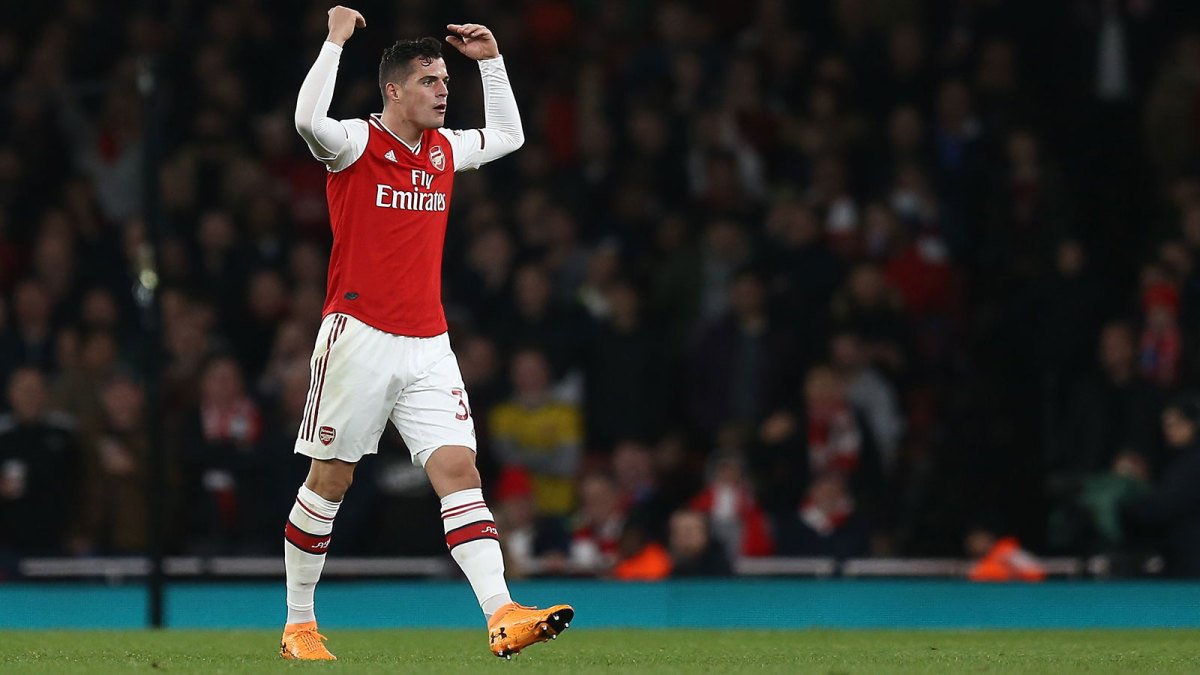It was interesting to witness the bubble in which Granit Xhaka operates when the board with his number was raised in the home match against Crystal Palace. It was a case of ‘Come in number 34, your time is up’. Actually, thinking about it, what’s with the 34? Could it be Xhaka’s favourite roulette number if he is enjoying a bit of online casino games UK in his spare time? I mean, it’s unusual for a first team squad player – especially one that is a regular pick for the first team. In the summer of 2016, when he joined the club, he took the number 29 shirt – fair enough, the only lower number available was 27. Two years on, when Unai Emery arrived, Xhaka switched to number 34. And here's his explanation - “The number 34 has a big significance for me. It was my first number as a professional and it’s aways brought me luck. I’ve even got the number tattooed on my back and on my arm. My brother wears No.34 too and when I left Basel, he took the shirt straight away, so it’s a pretty important number in our family.”
Ok, fair enough, but when he saw his number on the board, as Unai Emery put Buyako Saka on in a game in which Arsenal were chasing a winner, he threw a strop. He petulantly threw the captain’s armband in the direction of Pierre-Emerick Aubameyang as the crowd cheered the switch. Granted, that reaction from the supporters was uncalled for. Better to express their discontent for Xhaka by simply not applauding him off. But this is football today.
What happened next was that Xhaka made it about his ego, as opposed to the team. Were it the latter, he would have left the pitch quickly and without fuss to allow his side to get on with trying to get back in the lead. Although his actions – taking his time to leave the field as if Arsenal were ahead, encouraging a crowd booing at his lack of urgency to make more noise, and then removing his shirt before storming down the tunnel – were understandable from a psychological point of view, it needs to be remembered that this was the club captain. Such a figure should not be unprofessional and egotistical, which Xhaka was.
I am becoming tired of highly-paid prima donnas protesting at being subbed in what is a 14-man game. It’s too much of ‘Me! Me! Me!’ - as opposed to thinking about the needs of the team. This applies equally to Mesut Ozil as well.
When will players realise that managers are going to use their full complement of subs, and understand that the goalkeeper and the two centre backs are rarely changed? So if you are in one of the eight ‘vulnerable’ positions – in terms of substitutions – there is more than a one in three chance that you will be removed from the field for tactical or (ideally) time-wasting reasons. That decision is taken by the manager, for the good of the team. If he has to start worrying about players being upset about his choice of who to change, we are in territory where the players, rather than the manager are running the team. I recall a game in a major finals (maybe the 1992 Euros, or the 1994 World Cup) when Jan Wouters refused to come off for Holland and the manager switched the substitution on the digital board to a younger player. That is player power, although we have never seen it expressed to that degree in England (although I recall Carlos Tevez refusing to warm up for Manchester City once). I imagine Xhaka would have stayed put if he thought he could get away with it.
It was interesting to see Lucas Torreira exit the field at the nearest touchline the following weekend, even though his side were 1-0 up against Wolves. He took the long walk around the pitch and behind the goal to reach the dugout, and received warm applause on the route from the Arsenal supporters. No sign of a strop. Doubtless he took note of the crowd’s reaction to a hesitant Xhaka.
Hopefully, this will set the tone for future switches. Contrast it with rugby union, in which even the top performing players are removed. No fuss, no nonsense, just straight off and on with the game. Because rugby players get that it is a team sport and the team is more important than the individual. If Unai Emery has eleven players on the field with that kind of attitude, then his substitutions can always be to waste time as opposed to change a game.
_______________________________________________________________
You can follow The Gooner on
Twitter
Facebook
Instagram
or subscribe to our
YouTube channel (where you can find the GoonerFanzineTV weekly podcast)
The October edition of the monthly (original) Gooner podcast can be listened to and downloaded here
_______________________________________________________________
Buy the current issue of The Gooner
Issue 279 of The Gooner can be bought from our online store on this page
Subscribe to The Gooner
If you wish to subscribe to receive every issue of The Gooner by post, UK and abroad options are on this page.








